From Sanctions to Synergy: How Nigeria Can Turn Fintech Compliance into a Growth Engine 
By Immanuel O. Umukoro Policy & DFS Advocacy Manager, EFInA
Let’s Begin with the Promise, and the Pause!
Nigeria’s Fintech sector is one of Africa’s brightest growth stories, but equally stands at a crossroads. As of 2023, 64% of Nigerian adults were financially included through formal channels, but less than 20% are financially healthy. The gap between having access and achieving real financial well-being is wide. Since 2020, EFInA has tracked an unsettling trend: more Nigerians are retreating from formal financial services in favour of informal alternatives, citing poor experiences, eroded trust, and fear of systemic failure. This narrative is not one of people closing their bank accounts or digital wallets, but an increasing use of informal services by banked individuals.
This trust deficit has been compounded by a string of regulatory sanctions; at least five Fintechs in the past 24 months were penalised and barred from onboarding new customers for compliance breaches, at least for a period of time. While necessary for safeguarding the financial system, the consequences ripple beyond the sanctioned firms: halted growth, investor concerns, and diminished trust that casts a shadow of doubt on the entire digital finance ecosystem. And with Nigeria targeting a $1 trillion economy by 2030, for which Fintechs are a key driver, the stakes could not be higher.
Why Startups Feel the Pinch
- Sanctions Hit Hard and Fast: For early-stage Fintechs, losing the ability to onboard new customers can be a death sentence. Revenue stalls, cash flow dries up, and competitors fill the vacuum. Nigeria commands about one-third of Africa’s Fintech market, a space where even short disruptions can erase hard-won market share. Regulations and compliance should never be existential threats.
- Compliance Costs are a Structural Barrier and Can Kill Momentum: Many startups (early-stage Fintechs) operate on thin margins, and regulatory compliance costs across audits, licensing fees, and KYC integration can consume disproportionate portions of operational budgets. Meeting regulatory and compliance requirements is swallowing a large share of a startup’s budget. Many outsource KYC checks to third-party providers, which improves compliance but drives up costs, squeezing already thin margins. The problem is not just a lack of in-house capacity; it is the multiple and sometimes duplicated layers of compliance that startups have to deal with.
- Inclusion Goals Take a Hit: Fintechs are often the first and almost the only access point to financial services in rural and underserved areas where traditional banks have limited reach and wish not to invest. When sanctions sideline them, the impact is not contained to their balance sheet; it removes access points for underserved and excluded populations, delaying progress toward closing national, regional, and subnational financial inclusion gaps across priority segments.
Why Regulators Act and How They are Evolving to Balance Safety and Growth
- Sanctions Are About Safety, Not Suppression: Sanctions are not arbitrary, nor an end in themselves. They are essential enforcement tools and a means to an end. Regulatory actions protect consumers, prevent fraud, deter bad actors from engaging in bad market conduct, and maintain financial system stability. Licensing steps, beginning from document checks to physical inspections, are not box-ticking exercises; they are risk controls.
- Compliance Is Becoming Easier: The Central Bank of Nigeria (CBN) is streamlining the licensing process. Fintechs can now submit documents online and schedule pre-licensing consultations to clarify requirements before applying. These efforts align with the principle that ‘compliance is not an enemy, but a growth enabler’ as regulators frame adherence as a lever for building trust and scalability.
- Collaboration Is the New Currency: Regulators are urging Fintechs to consolidate advocacy under industry umbrellas like the Fintech Association of Nigeria (FintechNGR), Committee of e-Business Industry Heads (CeBIH), etc, to create a stronger voice and faster policy feedback loops. For the CBN, a united industry voice improves dialogue quality, accelerates resolution of pain points, and enables co-creation of policies that balance innovation with systemic safety.
Four Ways to Turn Compliance into Growth
- Adopt Risk-Based Rules: At EFInA, we advocate for a calibration of requirements to a firm’s size and risk profile, as India’s tiered sandbox model does. This facilitates innovation while maintaining oversight.
- Build Shared KYC Infrastructure: A national KYC utility integrated with BVN and NIN data could cut costs for smaller players. This would reduce duplication, compliance efforts, and improve verification accuracy.
- Institutionalise Dialogue: The apex regulator must lead the partnership efforts by collaborating with market facilitators like EFInA to hold quarterly multi-stakeholder forums that include regulators, Fintech associations, grassroots agent networks, and consumer advocacy groups to ensure regulations are practical and inclusive. The Financial Services Regulation Coordinating Committee (FSRCC) must be an integral part of this periodic institutional policy and regulatory dialogue to further strengthen efforts towards policy and regulatory harmonisation.
- Make Enforcement Transparent: Publish anonymised case studies of past sanctions, outlining violations, remedial steps, and reinstatement timelines to clarify regulatory expectations on compliance, and pathways to restoration in order to reduce fear-driven disengagement
The Bottom Line
Nigeria’s Fintech ecosystem plays an important role in the nation’s innovation journey and pathway to an inclusive digital economy, and cannot be trapped in an ‘us versus them’ standoff between regulators and innovators. Sanctions will remain part of the toolkit, but with risk-based frameworks, shared compliance tools, and regular dialogue, they can become less of a roadblock and more of a speed bump on the road to a stronger, safer, and more inclusive digital finance system. This is because sanctions, while critical for integrity, can inadvertently slow progress toward inclusion if applied without proportionality or without parallel support mechanisms.
The next phase of Nigeria’s digital finance evolution must shift from sanctions as stop signs to compliance as an accelerator, a tool not only for risk management but also for building the trust and scale needed to meet national inclusion targets, financial systems stability, and global AML/CFT requirements. The goal is not to choose between safety and scale, but to design a compliance culture that delivers both.
Immanuel Umukoro is a Digital Finance Services (DFS) Specialist and currently serves as the DFS and Policy Advocacy Manager at EFInA.



